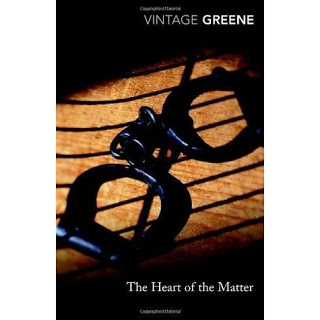
As an African national, I’ve always found it rather depressing that despite all the impact the British had on our continent we were not even an important part of their Empire. India was the jewel. We were just: there. And even within Africa, there was a heirarchy – South Africa and Nigeria at the top, and somewhere towards the bottom countries like Sierra Leone. This book tells the story of some sad British officials in Sierra Leone, and shows that at least some of the colonizers apparently felt they were having almost as bad a time as the colonized.
Freetown is all men on their way up or on their way down. Inspector Scobie is among the latter, and a rarity among the British in that city, in that he actually like Sierra Leone, and would like to stay there. He is not promoted however, and his wife is miserable at the idea of spending her life there with a minor official. A man so upright he is almost abnormal, Scobie agonises over taking a loan from a local businessman to be able to send his wife to South Africa. He does it in the end, and once she has left, he falls into an affair with a much younger woman. His wife changes her mind and comes home again, and he now is trapped: he feels bad for his wife, and bad for his mistress. Then major plot twist: his wife insists he attends Communion with her. Yes, I also didn’t find this to be a major plot twist. But it clearly is to Graham Greene, and to his creation Scobie. He can’t face the dishonesty, and so – he tells his wife the truth. Just joking! He tells his mistress the truth. Just joking! He doesn’t do either of these rational things. He kills himself.
For all that I mock its ending, I really rather liked this book. It is, as ever with Greene, elegantly written, and evokes a wonderful sense of Sierra Leone in the second world war. Try this lovely description of a new arrival: “Wilson sat on the balcony of the Bedford Hotel with his bald pink knees thrust against the ironwork. It was Sunday and the Cathedral bell clanged for matins. . . . (He) stroked his very young moustache and dreamed, waiting for his gin-and-bitters.” Wilson will later fall in love with Scobie’s wife, and here he sees Scobie for the first time:
He couldn’t tell that this was one of those occasions a men never forgets: a small cicatrice had been made on the memory, a wound that would ache whenever certain things combined – the taste of gin at mid-day, the smell of flowers under a balcony, the clang of corrugated iron, an ugly bird flopping from perch to perch.
THE HEART OF THE MATTER captures a kind of overwrought moral universe that in some ways rather dates it; but for me at least it also rather made me reflect how many of my own problems might be self-created. As a side point, I do want to close by saying that it does includes a scene so common in literature as to be almost archetypal: a young man having a terrible time at a brothel. I wish I had begun at the start of this blog counting how many of these scenes I read. It’s incredible how many of them there are, relative to how few there are about the people who are really having a bad time in brothels. But I guess prostitutes don’t have that much time for writing.
